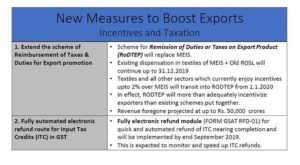The Government of India is attempting to devise a system to offer tax remission benefits on sugar exports, which were classified as “restricted” in the middle of 2022. In addition, the government is taking into account a request from tea exporters to increase the rate of tax remission.
In order to guarantee that no additional domestic taxes are applied to shipments of goods intended for export, the Remission of Duties and Taxes on Export Products (RoDTEP) system was introduced in January 2021.
As a preventive action to increase domestic supply and prevent a price spike, the sweetener was taken out of the “free” category in June 2022, and as a result, the authorities had refused advantages under the scheme to sugar exporters.
“The RoDTEP advantages are not applicable to any banned item. Therefore, sugar has been unable to receive RoDTEP since it was added to the restricted list, a senior Commerce Ministry official informed The Hindu.
The Sugar sector’s appeal to government
The Department of Food and Public Distribution has received an appeal from the sugar sector, requesting that the restriction be modified and returned to the free category along with other riders, such as obtaining export authorization from the Directorate of Sugar.
We will see what form of notification can be sent out to reinstate the RoDTEP benefits once the Department of Food makes a decision, the official continued.


The Gujarat High Court stated earlier this month that the government had occasionally permitted the export of sugar under certain permits, and that those shipments need to be qualified for the benefits of the RoDTEP. The court had emphasized that there was a need to distinguish between commodities whose exports are completely prohibited and those whose exports are subject to restrictions.
Abhishek A. Rastogi, the founder of Rastogi Chambers, who represented the petitioners in the Gujarat High Court case, stated that “if the government means to unambiguously provide these tax remissions to restricted products, it may need to create a fresh category for merchandise exports, going beyond the present ones of “free” and “restricted,” to denote that certain exports are permitted on a conditional basis.”
Based on a request from the sector, the Commerce Ministry is also thinking about raising the RoDTEP rates for tea exports, particularly for premium tea. “The official panel established for updating the RoDTEP rate schedules for various products has received data submitted by the Indian Tea Association for review of the RoDTEP rates,” an official stated.
The Export Quota relocation by Government
The seventh reallocation of the export quota for the sugar season of 2022–2023 resulted in an adjustment to the monthly release quantity due to the trade-off between the export and domestic monthly release quantities.
To prevent sugar from being exported uncontrollably and to guarantee that there is enough sugar available for domestic consumption at a fair price, the government had decided to permit sugar exports up to a reasonable limit starting on November 1, 2022, and ending on October 31, 2023.
DFPD released sugar mill wise export quota of 60 LMT for SS 2022-23.https://t.co/LvKW7FxN5p pic.twitter.com/s6wbEm9e43
— Department of Food & Public Distribution (@fooddeptgoi) November 5, 2022
As stated by the Ministry of Commerce’s Directorate General of Foreign Trade (DGFT) in notification No. 40/2015-20, issued October 28, 2022. The further also modified the export guidelines for sugar.
Following that, the DFPD assigned sugar mills an export quota of 60 LMT for the 2022–2023 sugar season starting on November 1, 2022, coupled with instructions for sugar export 3 in a letter of even number dated November 5, 2022. The DFPD chose to low swap the export quota quantity from the quantity of the monthly release quota in accordance with clause ‘E’ of the guidelines dated 05.11.2022.
In this context, this Department also reviewed representations and agreements made by sugar mills to exchange their export quota quantity and domestic monthly release quantity. As a result, additional export quantity was assigned, and the sugar mills’ domestic quota were adjusted accordingly.
However in the past few months, a lot has been going on with the government sector trying to make peace with the farmers, sugar mill owners, and the exporters. It’s a matter of time that will show what steps will the government take in order to tackle this sweet problem.











